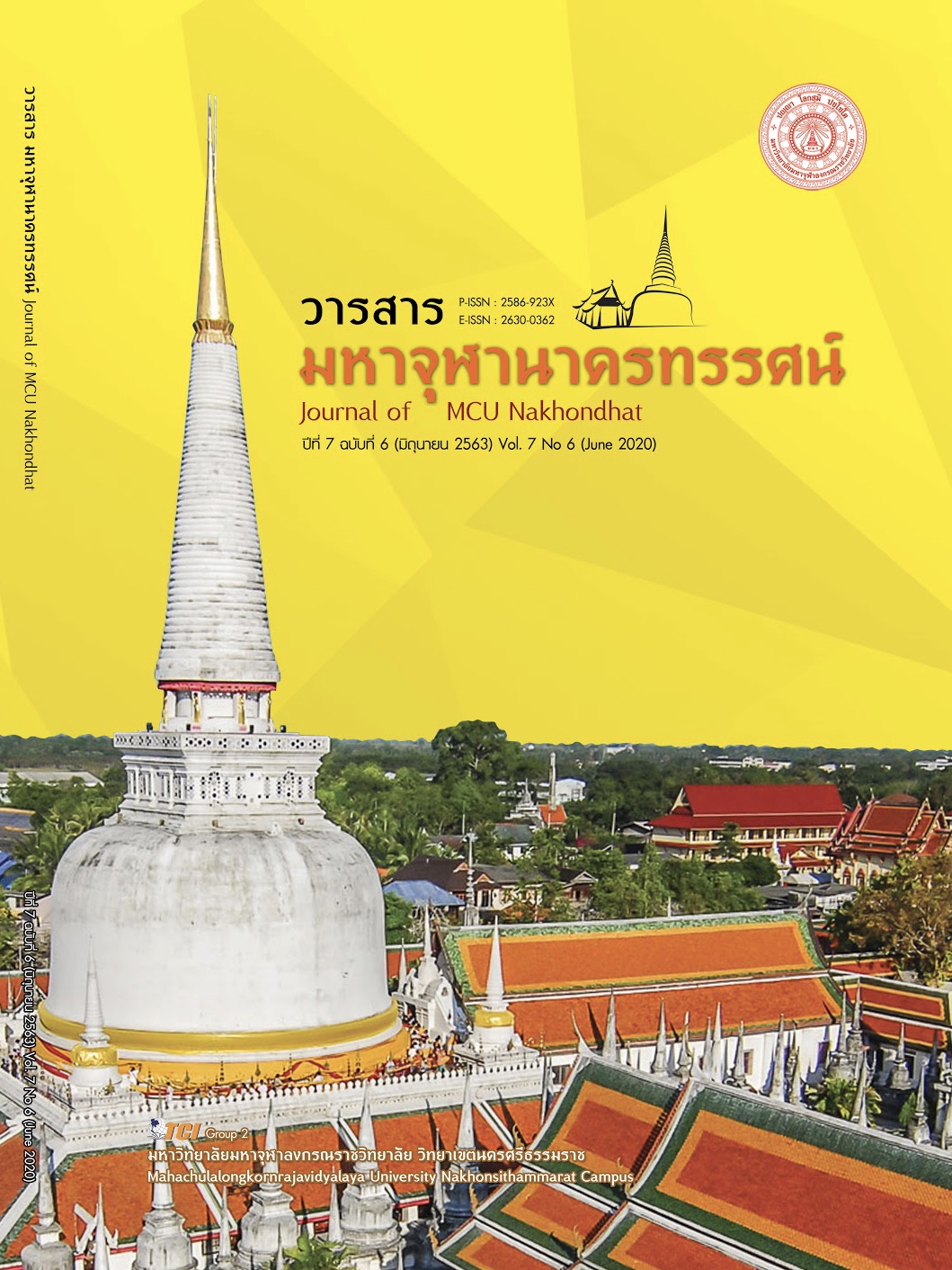DEVELOPING ANALYTICAL THINKING ABILITY OF MATHAYOMSUKSA 4 STUDENTS IN BIOLOGICAL SCIENCE USING PHENOMENON – BASED LEARNING
Main Article Content
Abstract
This classroom action research aimed to develop 10th graders' analytical thinking ability by using phenomenon – based learning to meet the criteria of 75 per cent. The participants were 15 students from a total of 29 students in a classroom who studied Biological Science course at Phadungnaree School, Mahasarakham Province, the academic year 2019. By developing the purpose of this research, the researchers collected data from two instruments. Firstly, the 4 multiple – choice analysis test, not based on content, divided into 3 components, 10 items each, for a total of 30 items, takes 1 hour. Secondly, the student interview consisting of 3 aspects: the ability in Analytical thinking in the teaching and learning activities and the teacher' teaching. Then analyze the data with basic statistics the results of the study revealed that 75% of the students who learned through the phenomenon – based learning management plan had the analytical thinking ability through the criteria that set by the researcher. There were 7 students passing the criteria specified by the researcher in the first cycle and found that the target group of 8 people did not meet the criteria due to the duration of the activities. In the 2nd operation cycle, there were 12 students who passed the specified criteria from the researcher, and there are still 3 target group students who do not yet pass due to lack of motivation in teaching and learning activities. The operation cycle 3, it was found that all students passed the criteria set by the researcher due to the time and familiarity in teaching and learning activities, enabling them to develop their ability to think analytically.
Article Details
References
กระทรวงศึกษาธิการ. (2560). แผนพัฒนาการศึกษาของ สป. ฉบับที่ 12 (พ.ศ. 2560 – 2564).
ชลธิชา พลชัย และไพโรจน์ เติมเตชาติพงศ์. (2559). การพัฒนาความสามารถในการคิดวิเคราะห์และผลสัมฤทธิ์ทางการเรียนเรื่องไฟฟ้าของนักเรียนชั้นมัธยมศึกษาปีที่ 3 โดยใช้การจัดการเรียนรู้แบบวัฏจักรการเรียนรู้ 7 ขั้น (7E). GNRU รายงานสืบเนื่องการประชุมสัมมนาวิชาการ, 17, 772-783.
ณัฏฐพงษ์ เจริญทิพย์. (2542). การพัฒนาความคิดสร้างสรรค์ทางวิทยาศาสตร์: ทัศนะแบบองค์รวม. กรุงเทพมหานคร: เลิฟแอนด์ลิพเพลส.
ดิลก ดิลกานนท์. (2534). การฝึกทักษะการคิดเพื่อส่งเสริมความคิดสร้างสรรค์. ใน ดุษฎีนิพนธ์การศึกษาดุษฎีบัณฑิต สาขาวิชาการวิจัยและพัฒนาหลักสูตร. มหาวิทยาลัยศรีนครินทรวิโรฒ.
ประสาท เนืองเฉลิม. (2558). แนวการเรียนรู้วิทยาศาสตร์ในศตวรรษที่ 21. วารสารพัฒนาการเรียนการสอน มหาวิทยาลัยรังสิต, 9(1), 136-154.
พงศธร มหาวิจิตร. (2562). การประยุกต์ใช้แนวคิดการเรียนรู้โดยใช้ปรากฏการณ์เป็นฐานร่วมกับการเรียนรู้แบบเชิงรุกในรายวิชาการประถมศึกษาเพื่อเสริมสร้างทักษะการเรียนรู้ในศตวรรษที่ 21. วารสารศึกษาศาสตร์ มหาวิทยาลัยขอนแก่น, 42(2), 73-90.
พิมพ์รภัช เตชาธนะเกียรติ์ และอัญชลี ทองเอม. (2559). การพัฒนาการคิดวิเคราะห์โดยใช้บทเรียนประกอบเกมวิชาชีววิทยา สำหรับนักเรียนชั้นมัธยมศึกษาปีที่ 5. วารสารครุศาสตร์ มหาวิทยาลัยธุรกิจบัณฑิต, 2, 27-38.
ศรเนตร อารีโสภณพิเชฐ. (2557). การพัฒนาทักษะการคิดวิเคราะห์ของนักศึกษาระดับบัณฑิตศึกษาโดยการเรียนรู้โดยใช้วิจัยเป็นฐานร่วมกับการใช้แผนที่มโนทัศน์.ใน การวิจัยในชั้นเรียน. จุฬาลงกรณ์มหาวิทยาลัย.
ศศิธร ปักกาโล. (2558). การใช้ปัญหาเป็นฐานพัฒนาความสามารถในการคิดวิเคราะห์ของนักเรียนชั้นมัธยมศึกษาปีที่ 5 เรื่องระบบต่อมไร้ท่อ. ใน วิทยานิพนธ์การศึกษามหาบัณฑิต สาขาวิชาการสอนวิทยาศาสตร์. มหาวิทยาลัยรังสิต.
สถาบันส่งเสริมการสอนวิทยาศาสตร์และเทคโนโลยี. (2558). รายงาน PISA 2015. เรียกใช้เมื่อ 7 สิงหาคม 2561 จาก https://pisathailand.ipst.ac.th/pisa/reports/2015/
สถาบันส่งเสริมการสอนวิทยาศาสตร์และเทคโนโลยี. (2560). การจัดสาระการเรียนรู้กลุ่มสาระวิทยาศาสตร์ หลักสูตรการศึกษาขั้นพื้นฐาน. กรุงเทพมหานคร: คุรุสภาลาดพร้าว.
สำนักงานคณะกรรมการพัฒนาการเศรษฐกิจและสังคมแห่งชาติ สำนักนายกรัฐมนตรี. (2560). สรุปสาระสำคัญ แผนพัฒนาเศรษฐกิจและสังคมแห่งชาติ ฉบับที่ 12 (พ.ศ. 2560-2564).
อรพรรณ บุตรกตัญญู. (2561). การเรียนรู้โดยใช้ปรากฏการณ์เป็นฐานเพื่อการสร้างมุมมองแบบองค์รวมและการเข้าถึงโลกแห่งความจริงของผู้เรียน. วารสารครุศาสตร์ จุฬาลงกรณ์มหาวิทยาลัย, 46(2), 348-365.
Sahlberg, P. (2015). Finland’s school reforms won’t scrap subjects altogether. The Conversation. Retrieved August 8, 2019, from http://theconversation. com/finlands-school-reforms-wont-scrap-subjects-altogether-39328
Widya, P. & Baskoro, A.P. (2019). Effectiveness of a Generative Learning-Based Biology Module to Improve the Analytical Thinking Skills of the Students with High and Low Reading Motivation. International Journal of Instruction, 12(1),1459-1476.
Zhukov, T. (2015). Phenomenon-Based Learning: What is PBL? Retrieved August 7, 2018, from https://www.noodle.com/articles/phenomenon-based-what-is-pbl


